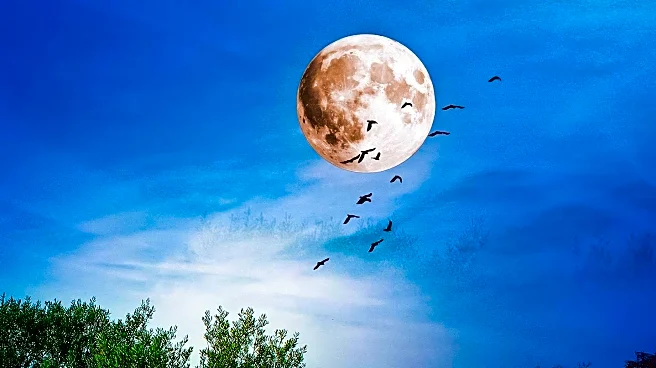What's Happening?
The last full moon of the summer, known as the corn moon, is set to appear on September 7 at 2:09 p.m. This moon is traditionally associated with Native American tribes who harvested corn during this period. The corn moon is also referred to as the 'autumn moon,' 'falling leaves moon,' 'wine moon,' 'barley moon,' and 'song moon' in various cultures. The harvest moon, which is the full moon closest to the autumnal equinox, typically occurs in September but can occasionally fall in October. This year, the harvest moon will occur in October, specifically on October 6 at 11:47 p.m., and is known as the hunter's moon, named for the prime hunting season in October.
Why It's Important?
The corn moon and subsequent harvest moon have cultural and historical significance, particularly for agricultural communities. The bright moonlight provided by these moons has traditionally aided farmers in harvesting crops after sunset. This natural phenomenon continues to be a point of interest for astronomers and cultural historians alike, offering insights into the ways ancient societies interacted with and relied on lunar cycles. The naming conventions of these moons reflect the seasonal activities and cultural practices tied to the lunar calendar.
What's Next?
Following the corn moon, the lunar cycle will continue with the last quarter moon on September 14, the new moon on September 21, and the first quarter moon on September 29. October's full moon, the hunter's moon, will serve as this year's harvest moon, providing another opportunity for cultural and astronomical observation. Communities and enthusiasts may plan events or gatherings to observe these celestial occurrences, fostering a connection to historical traditions and natural cycles.
Beyond the Headlines
The cultural significance of the corn moon and harvest moon highlights the intersection of astronomy and anthropology. These moons serve as reminders of the historical reliance on lunar cycles for agricultural planning and cultural rituals. As modern society becomes increasingly disconnected from natural cycles, events like the corn moon offer opportunities to reconnect with nature and appreciate the historical wisdom embedded in these traditions.










